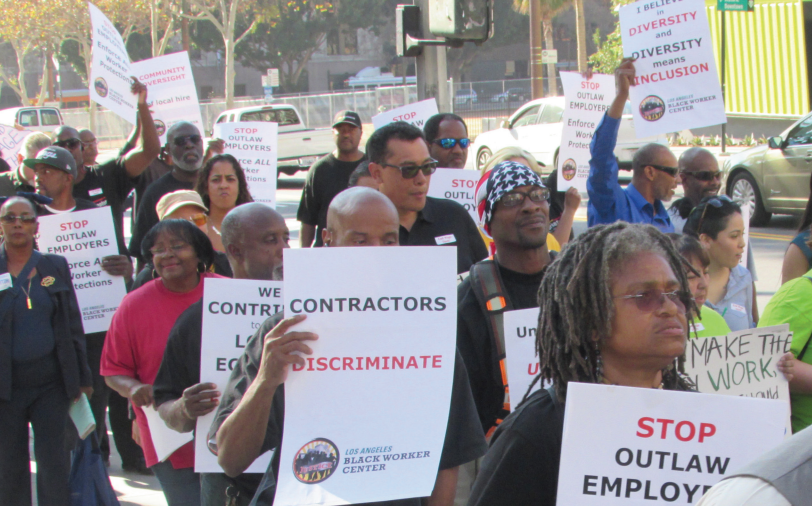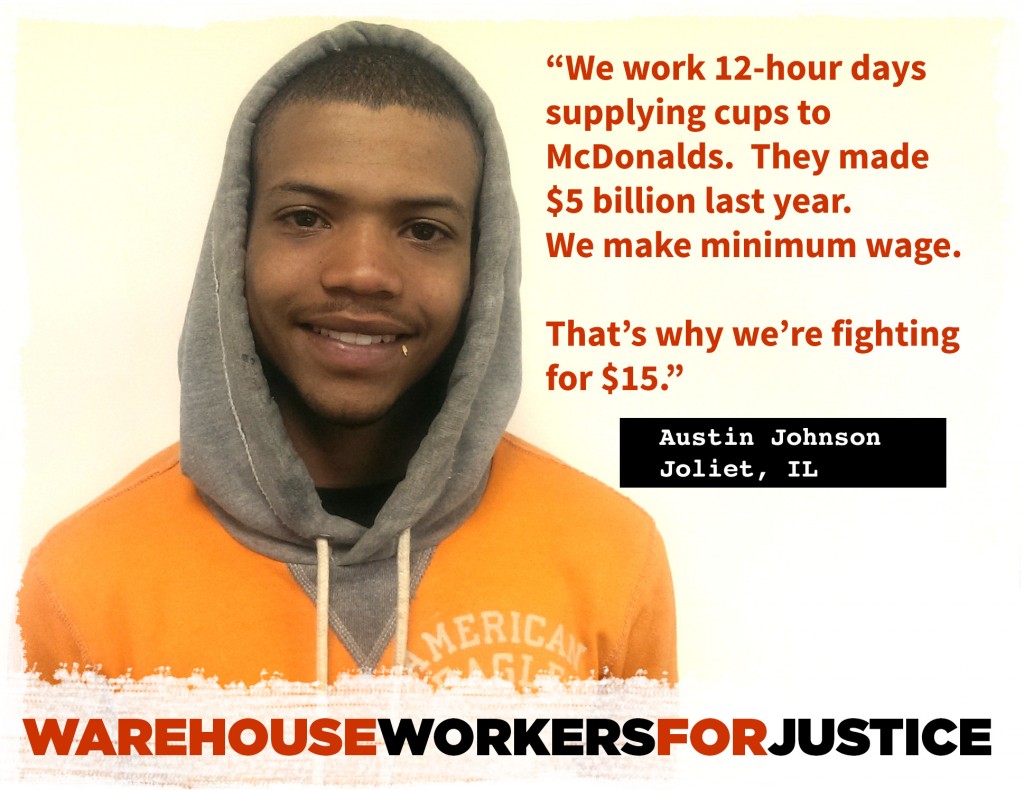Union and Nonprofit Leaders: Labor Should Shift Its Focus to Organizing Black Workers
July 17th, 2015By Andrew Elrod

In 1956, as Martin Luther King Jr. and Bayard Rustin struggled to sustain the historic boycott of segregated public transit in Montgomery, Alabama, Rustin turned to the union leader A. Phillip Randolph for advice. The carpool for black workers was faltering. “Go up to Birmingham,” Randolph told them, “where the steel workers are making enough to afford two cars. Ask them to donate their second car.” According to historian Judith Stein, King reported the steel workers saved the boycott.
At their height, American labor unions proved an invaluable resource to the civil rights movement—through both financial security, which helped enable private activism, and the institutional funding of organizations like SNCC and events like the 1964 March on Washington. Today, despite years of decline, the labor movement continues to provide economic stability in many black communities. Of all demographic groups, black workers have the highest union membership rates.
These historic ties have led some to see black workers as a cornerstone to any effort to rebuild a movement in deep decline. And drawing from the national momentum of organizing around police reform, many black labor leaders today are leading the charge. On Friday, May 1, black labor and community leaders met at Columbia University for the third-annual State of Black Workers in America Conference, where they made this case to an audience of philanthropy staffers and activists.
“We’ve got to resist the black jobs crisis,” said Lola Smallwood Cuevas, director of the Los Angeles Black Worker Center. “Our movement sees the deep connection between economic justice and racial justice, and what that means for the safety of our community, particularly young black men and women.”
Nationally, black unemployment is more than double white unemployment. Cuevas points out the tremendous wealth gap between white and black families—median household wealth is $142,000 for whites, while only $11,000 for blacks—and says, “We’re living through the same poverty that’s been with us since after Reconstruction.”
The conference also occasioned the release of two reports on black leadership in labor unions and nonprofits, and served as a pitch for philanthropy to begin investing in a new wave of black-led organizing.
“I am hopeful that this [conference] is an indication that there is an opening in philanthropy to support race-conscious efforts to organize black workers and communities,” said Susan Wefald, Executive Director of the Discount Foundation, which is hoping to spark increased funding in black-led nonprofits as it spends down its endowment this year and closes its doors.
Read more at Working In These Times
#BlackWorkersMatter Report Released
May 1st, 2015On Friday, May 1, the #BlackWorkersMatter report was released at the State of the Black Worker in America conference at Columbia University. This report is the product of several years of discussion and planning. The Discount Foundation and the Neighborhood Funders Group partnered with other funders to convene groups organizing black workers two years ago, and then to produce this report over the past few months. They brought together a stellar group of researchers and writers for the #BlackWorkersMatter report. It has a foreword by Columbia professor and MSNBC contributor, Dorian Warren, and includes five sections:
- Algernon Austin explains how the range of problems facing African American communities are connected to the lack of number of jobs available to blacks and the decline in the quality black jobs.
- Marc Bayard looks at the partnership between the labor movement and black workers, highlighting the potential for black worker to help rejuvenate and transform the labor movement into the ultimate force for the working class and civil rights.
- Linda Burnham examines the jobs crisis facing African American women and explains how low wages trap black women, together with their families and communities, in cycles of economic distress.
- Steven Pitts writes about the broader context in which to view the black jobs crisis and analyzes the prevalence of low-wage work among black workers, especially in the current age of inequality.
- Sean Thomas-Breitfeld provides examples of on-the-ground work and recommendations for funders, drawn from an analysis of in-depth interviews with community organizers, national experts and funders.
The report is available for download here.
Fast Food Workers in 236 Cities Pull Off Largest Strikes Yet as Other Low-wage Workers Join Fight
April 17th, 2015David Moberg
A hand-lettered placard, reading “McDonald’s: Stop Fooling Around, $15 and a union,” caught the spirit of the crowd of at least 3,000 protestors in Chicago for a march to a McDonald’s restaurant in the downtown Loop area connected to the Chicago Board of Trade. In 236 cities in the U.S. and roughly 100 more around the world from Sao Paulo to New Zealand and from Glasgow to Tokyo, according to protest spokespeople, fast food and other low-wage workers joined together to pressure employers like McDonald’s to raise their workers’ pay.
Organizers claimed that it was the largest protest by low-wage workers in U.S. history. And it may very well rank as one of the broadest global worker protests ever undertaken against multinational corporations—one reinforced by recent investigations and lawsuits in Europe against the company for violations of labor, health, safety, tax and other laws.
With its intense public relations campaign, the campaign amplifies the actions of fast food workers—some of whom walk off their assigned shifts as in a traditional strike. For brand-sensitive consumer product companies, many organizers believe, such bad publicity can cost companies greatly—and potentially open up new organizing possibilities.
These protests have also changed the political climate, both locally and nationally. Seattle and Sea-Tac in Washington and San Francisco have raised their minimum to $15 an hour. The same change may be possible sometime soon in both Los Angeles and the District of Columbia. In Chicago, politically embattled Mayor Rahm Emanuel agreed under political pressure to raise the minimum to $13 over several years—far above what he would have contemplated a short while ago. The movement is likely to keep pressure over the coming year on Democratic candidates, even presidential aspirant Hillary Clinton, to advocate the higher pay levels.
Some established unions have played key roles in building this movement over the past two and a half years, most notably the Service Employees International Union—which has largely staffed and bankrolled the Fight for $15, but also by unions such as the United Food and Commercial Workers, the initiator of OURWalmart, and in Chicago, the small but militant United Electrical Workers, who founded Warehouse Workers for Justice. WWJ members—including some from a warehouse/assembly plant in the Chicago suburbs that makes paper cups for McDonald’s—joined in the April 15 rally.
Workers rally for higher wages, allege wage theft with Joliet temp agency
April 17th, 2015Lauren Leone-Cross
JOLIET — Nearly three dozen warehouse workers who distribute cups for McDonald’s rallied Wednesday in downtown Joliet for higher wages while also alleging that Elite Staffing — a temp agency — stole workers’ wages.
The Joliet protest was part of a series of “Fight for $15” protests planned across the country — one of the biggest national pushes yet for a minimum wage hike.
Along with a call for higher wages, the rally served another purpose: To let Elite know workers filed a lawsuit in Cook County earlier that morningclaiming they are not being compensated for all hours worked at packaging companies in Will and Cook counties.
Tara Anderson, 45, of Joliet, was among those protesting outside the temp agency. She said she worked for Elite from August 2013 to December 2014 before being let go.
“They made an email saying to fire me, to give me my last check … because I kept calling for money that they owed me, that they docked out of my pay,” Anderson said. “[The agency] told me they have so many workers that I should understand they made a mistake. I don’t need to understand. It was Christmas time. I needed my money.”
Workers alleged they are required to show up as early as 3:30 a.m. for a 6 a.m. shift. Then Elite often buses them from warehouse to warehouse, only to be repeatedly turned away and sent home, said Mark Meinster, with Warehouse Workers for Justice, which organized the rally.
McDonalds Supply Chain Workers Join the Fight for $15
April 14th, 2015Workers who distribute cups for McDonalds will protest Elite Staffing in Joliet, a temp agency alleged to have stolen workers’ wages. Afterward they will board a bus to Chicago to join 10,000 low-wage workers from sectors including fast food, home health care and education to demand $15/hour and the right to form a union.
Workers will file a lawsuit on Wednesday alleging that they were not compensated for all of the hours they worked at packaging companies in Will and Cook counties. Workers at Elite must show up as early as 3:30 a.m. for a 6:00 a.m. shift. Often Elite buses them from warehouse to warehouse, only to be repeatedly turned away and sent home. Workers report that time is deducted from their paychecks for breaks or lunches that they don’t actually fully receive.
“We make cups for McDonalds, a $27 Billion company. They can afford to make sure we’re paid a living wage and that our rights are respected, said Austin Johnson, an Elite Staffing worker. Lorrie Wright, who was worked in several Joliet-area warehouses for large companies, says, “We are tired of poverty-level temp jobs. These are large companies that make money. It’s timefor them to step up and provide permanent jobs in the warehouses, not poverty-level temp jobs.”
Warehouse Workers for Justice has helped improve thousands of Illinois warehouse jobs by helping workers recover stolen wages and advocating for corporate and public policy changes that provide for stable, permanent living-wage jobs in Illinois’ thriving distribution sector. WWJ has offices in Joliet and Chicago.

